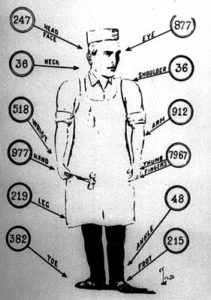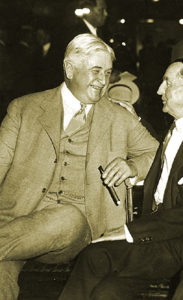A Resistance to Reform
“Time is the great reformer, but it cannot be hurried in its course.”
– Democratic Governor Simeon Baldwin,
inaugural address, 1913

Chart depicting employee accidents for a single year in a Waterbury brass factory
A Yankee of impeccable reputation and a former Chief Justice of the State Supreme Court, Democrat Simeon Baldwin won the governorship in both 1910 and 1912, but his cautious approach to the issues of the day differed little from his Republican opponents. Democratic legislators did succeed in establishing a state Public Utility Commission in his first term, but Baldwin’s calls for constitutional reform of the rotten borough system went unheeded.
Workers’ Compensation Act
Hazardous conditions in the state’s industries took an annual toll of the state’s workers, but the General Assembly resisted attempts at reform. In 1913, Governor Baldwin and Democratic leaders took advantage of their rare majority in the Senate to pass the state’s first Workers’ Compensation Act.
The World of J. Henry Roraback

J. Henry Roraback
At the height of his power in the 1920s, J. Henry Roraback dominated Connecticut like no political leader before him.
When it suited his political purposes, Roraback could bring the full weight of the legislature’s authority down on his foes. In 1925, he engineered the passage of the Bridgeport “Ripper Bill” which punished local Republicans who challenged his authority by suspending the city’s right to levy taxes.
Rural farmers were an important part of Roraback’s political base. His legislative allies sponsored major road building programs and increased appropriations to the state agricultural college at Storrs throughout the 20s.
This article is a panel reproduction from An Orderly and Decent Government, an exhibition on the history of representative government in Connecticut developed by Connecticut Humanities and put on display in the Capitol concourse of the Legislative Office Building, Hartford, Connecticut.
<< Previous – Home – Next >>








